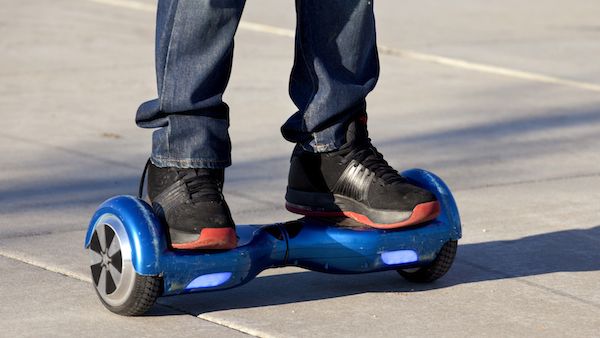You may have heard about hover boards in the news. In New York City, they’re illegal to ride in the street, and thousands have been recalled because some models spontaneously catch fire. As such, I never thought I would end up riding one. (I should say that if you have one, check to make sure it’s not one of the half million hoverboards that have been recalled. Call the Consumer Products Safety Commission at (800) 638-2772 to find out if yours has been recalled. )
But recently, my friend insisted I get on a hover board so he could film me for a short video project. After I got the hang of using it (don’t worry, it didn’t explode), I realized that my stumbles actually taught me a valuable lesson in positive and mindful thinking.

Read More: A Deaf Girl Teaches Her Deaf Puppy Sign Language
Moving short distances and making sharp turns wasn’t the hard part. What tripped me up? Ironically, I lost balance when I questioned my stability. I’d be doing just fine, riding straight and steady, and then I’d suddenly wonder: How long will it last? That moment of self doubt caused a subtle shift in the way I distributed my weight, and I lost my balance.
What mattered in conquering the learning curve was having faith and trusting the board would take me where I wanted to go. My thinking was important to assuring a good ride. If I believed the ride would be smooth, and didn’t worry about failure, I was more likely to zip around with ease. The hover board made the correlation between positive or negative thinking, action and outcome concretely obvious.
Equally detrimental to a smooth ride was getting distracted. If I got lost in thought, before I knew it I was wobbling around. If felt myself falling off the board, I learned that it was best not to resist; holding on too long only made the falls worse. Going with the flow was essential.
Eventually, I stopped questioning the ride and just enjoying myself. The ride was the smoothest when I was mindful and relaxed. The board was like a litmus test, showing me my current mental state.
Read More Mysterious Ways: A Rope of Hope
When I left the hover board behind, I reflected on how easy it is to forget how our thoughts influence our experience of life. We know we should stay positive, but sometimes it can be difficult to actually see how it makes a difference. We question ourselves even when life is good, we get distracted, and we overcomplicate things. And we lose our balance.
I probably won’t hop on a hover board again—I prefer to keep my feet on solid ground. But when I have moments of doubt, I’ll think of that experience and remember: The ride is so much smoother if I trust I’m being driven in the right direction.






